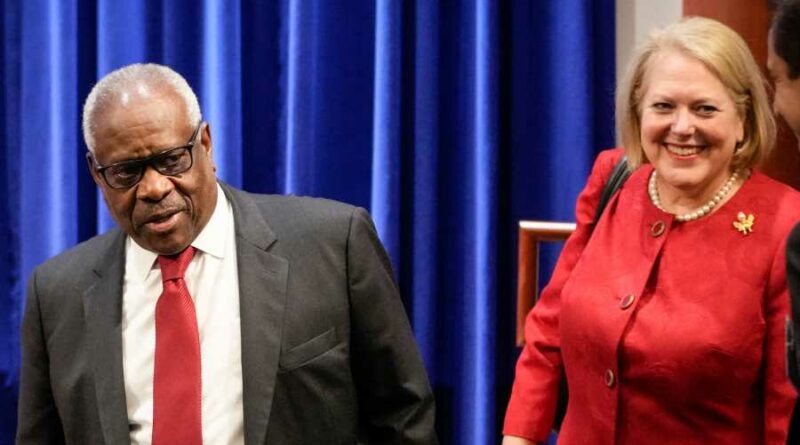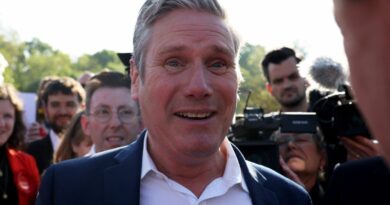The Supreme Court's Clarence and Ginni Thomas Scandal Is Unprecedented
The U.S. Supreme Court’s January 19, 2022 order in Trump v. Thompson was as brief as it was significant. By a vote of 8-1, with Justice Clarence Thomas as the lone dissenter, the Court refused a request by former president Donald Trump to block congressional investigators from gaining access to messages that Trump claimed were still covered by executive privilege. Those messages, between and among Trump administration officials during their final days in office, shed needed light on the origins of the Trump-fueled U.S. Capitol riot and insurrection, which had taken place one year earlier in Washington, D.C.
Significant but not surprising. The current president, the duly-elected Joe Biden, had waived any executive privilege claims over the Trump team’s material in the hope he could save time for members of a House Select Committee as they go about investigating the riot and insurrection. At that point, Trump’s legal case was so weak that even the most conservative justices in a century couldn’t come up with a good-faith argument to make it a winner. Everyone, that is, except for Justice Thomas, whose wife, Virginia, is an ardent supporter both of the former president and baseless conspiracy theories about the 2020 election.
Thomas dissented, though he didn’t say why. We know, however, thanks to an extraordinary story that broke Thursday, that Virginia Thomas was relentlessly texting Trump White House Chief of Staff Mark Meadows from November 2020 until the date of the Capitol riot urging Meadows and others to pursue baseless election-fraud charges and other stunts to try to overturn the results of Biden’s presidential victory. At one point, Virginia Thomas appeared to reference her husband, the sitting Supreme Court justice, making both of them potential fact witnesses in a case and a cause that may end up back before the justices before too long.
There have been plenty of scandalous Supreme Court rulings in its long history but there has never been a scandal like this. There have been plenty of scandals over judicial nominees, as Justice Thomas knows all too well, but never one that caused a clear and continuing threat to the appearance of the Court’s impartiality. One credible legal scholar after another has come forward in the past days to express shock at Thomas for not having recused himself from any cases involving the January insurrection given his wife’s role in the affair. At the least, they say, he must recuse himself now from any such cases.
You don’t need to be a legal expert to know that one spouse shouldn’t sit in judgment in a case in which the other spouse is a witness — or a suspect. That’s as classic a conflict of interest as one can imagine and by refusing to acknowledge it Justice Thomas has brought great discredit on himself and his colleagues on the Court. He’a also brought attention to another scandal that has lingered for decades: the justices have exempted themselves from enforceable conflict of interest rules that other judges must observe. Thomas gets to make his own call about recusal and no one can do anything about it short of impeachment or a federal prosecution based on a judicial disqualification law no one is likely to pursue.
For a little context and perspective I reached out Friday to Jeff Shesol, the Supreme Court historian and author of “Supreme Power: Franklin Roosevelt vs The Supreme Court,” a trenchant look at another Democratic president’s struggle with a deeply conservative Supreme Court bent on rolling back progressive programs. The email interview was lightly edited for length and clarity.
COHEN: Is there any precedent for such an episode in the history of the Court? How does this compare to prior scandals at the Court?
SHESOL: Well, my first reaction is that if you pitched this storyline as a scripted series on Netflix, you’d be told it’s too over-the-top to be credible. Yet here we are.
Second, on the grounds that it’s more useful than anything I might say at present, here is a piece I wrote for the NYT back in 2011 on the “extrajudicial” activities of Thomas, Alito, and others. They’re even more brazen today, if only because they have never faced any consequences (other than the opprobrium of the left and the mainstream media, opprobrium they welcome) for making political statements to politically minded crowds. You and I can write as many mean articles about them as we’d like, but short of impeachment, they’re untouchable and they revel in it.
Third, no, I can’t think of a single precedent for this sort of episode. Until Ginni Thomas, the spouses of Supreme Court justices (past and present) have understood that they should avoid activities that might reflect poorly, by association, on the reputation of the justice or might call into question the impartiality of the justice. But as recent reporting has made clear, Ginni Thomas is not merely indifferent to such expectations or unmindful of the old guardrails; she is a zealot, an ideological warrior, and sees herself as waging the same fight to the same ends that her husband is waging from the bench. There is no precedent for any of this.
Neither is there any real answer to it. In a very real sense, Clarence and Ginni Thomas are answerable only to Clarence and Ginni Thomas. The Trump Administration gave us all a hard lesson in how few actual rules bind the behavior of our national leaders, and how much depends on their good judgment and self-restraint.
In one of the texts, Ginni Thomas references a conversation with her “best friend,” whom observers say is her nickname for Clarence Thomas. Has there ever been a scenario at the Supreme Court where a sitting justice was or could be considered a fact witness in a government investigation the legalities of which might come before the Court?
Yes, I assumed that was Justice Thomas, too. I hesitate to offer a view on your question because I don’t really know—but I will say that I’ve never run across anything like that. And even if she’s not referring to Justice Thomas, the recent New Yorker story, among others, underscores the absurdity of the notion that (as they’ve claimed) Ginni does her thing and Clarence does his, and that they don’t discuss their work. This is a holy war, and, again, they are waging it in lockstep.
Stephen Gillers, the law professor and expert on judicial ethics, agrees with you. He told The New York Times yesterday that Ginni Thomas’s conduct caused damage both to her husband and to the Supreme Court itself. Gillers said: “The consequences of what she’s done is that I don’t think that Clarence Thomas can sit on any case involving, even remotely, the conduct of the election, the vote of Congress on Jan. 6, or any cases involving the Jan. 6 committee’s attempts to get information, including the committee’s efforts to get Eastman’s emails. He must recuse himself, and should have recused himself in the cases that have been heard up to now.”
How does the scenario presented by Ginni and Clarence Thomas compare to the conflict-of-interest case that tainted Supreme Court Justice Abe Fortas’s tenure on the Court over 50 years ago? He took speaking fees and kept retainer fees from financier Louis Wolfson who was then under investigation by the Securities and Exchange Commission. Immediately thereafter, there were conflict-of-interest questions about the man President Richard Nixon wanted to replace him, Clement Haynesworth, whose nomination ultimately was scuttled by the Senate? Is the Thomas case like those cases?
These examples strike me as different in important respects, not least that the Senate in those cases had greater leverage to address the problem. With Fortas’ nomination to serve as Chief in play, and later with Haynesworth’s nomination an open question, the Senate could simply deny them the appointment (or make it clear they’d be denied the appointment, and prompt them to withdraw). In the Thomas case, again, aside from impeachment—an impossibility given the composition of the Senate—there is nothing anybody can do about Thomas except complain loudly about him.
Beyond that, the Fortas and Haynesworth conflicts of interest seem more discrete, more easily defined and explained (speaking fees, retainer fees). Today we’re in murkier if, frankly, far more troubling territory. It was unwise or unethical for Fortas to accept speaking fees and retainer fees. But that’s utterly inconsequential compared to the Thomases: Ginni played an active role (which seems, with every passing revelation, to have been a greater role than previously disclosed or imagined) in trying to subvert the Constitution by overthrowing the results of a presidential election.
Her husband’s role, apart from his dissent from that unsigned order, is less clear—though it is clear enough that he acted (or would have acted, if the other conservatives had joined him) in shielding his wife’s role in the plot from scrutiny. Though his dissent is silent to his true motivations he has thus involved and implicated himself in the insurrection.
Andrew Cohen, a legal analyst and commentator, has covered the Supreme Court since 1997.
Source: Read Full Article


